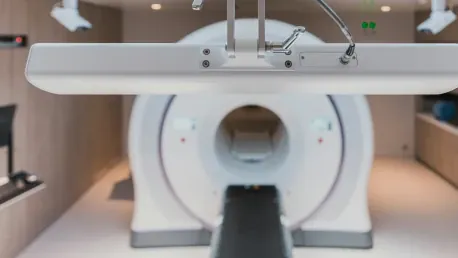The significant rise in wait times for MRI scans on Prince Edward Island (P.E.I.) has drawn attention to a major issue within the island’s healthcare system, sparking concern and debate among residents and experts alike. As of 2024, Islanders requiring routine MRI exams face an astonishing 524-day wait, or approximately 75 weeks. This figure starkly contrasts with Health P.E.I.’s intended goal of a 12-week wait, signaling an urgent need for intervention and systemic overhaul in the region’s medical infrastructure.
Persistent delays in accessing MRI scans have dire consequences for patient health, as delayed diagnostics can lead to undiagnosed and untreated conditions deteriorating over time. A striking example from Nova Scotia recounts the heart-wrenching experience of a woman who waited three years for an MRI, only to discover she had a brain tumor. Such critical delays highlight the importance of timely imaging to prevent serious health repercussions. Dr. Ania Kielar, an associate professor at the University of Toronto and president of the Canadian Association of Radiologists, strongly condemns the two-year wait, deeming it “totally unacceptable.” According to Kielar, MRI results for non-emergent situations should be delivered within 30 days to avert adverse health outcomes.
Staffing Challenges and Solutions
One of the primary factors contributing to the lengthy wait times for MRI scans on P.E.I. is a shortage of qualified technologists, which has severely hampered service delivery throughout 2024. With retirements significantly impacting staffing levels, MRI services have operated at just 50 percent capacity. In response, Health P.E.I. has announced plans to recruit new technologists starting in January, a move expected to alleviate the backlog. Until reinforcements arrive, the agency has resorted to hiring private agency staff to bridge the gap and ensure essential services continue to be provided.
However, even with these solutions in place, the backlog remains daunting. P.E.I. lags behind other provinces in MRI scans per capita and the availability of MRI machines. From 2022 to 2023, the island conducted just 33 MRI scans per 1,000 people, far below the national average of 55.6. Additionally, P.E.I. has only 5.7 MRI machines per million people compared to the Canadian average of 10.8. These statistics illuminate the broader issue of insufficient resources and infrastructure impacting timely access to vital diagnostic imaging on the island.
Personal Stories and Financial Burdens
The individual stories of Islanders experiencing prolonged MRI wait times vividly underscore the human impact of this systemic failure. Dean Blanchard of Summerside has endured chronic back and hip pain for 20 years, leading to frustration when faced with a two-year wait for his MRI. Similarly, his wife, suffering from a slipped disc, opted to pay for a private MRI to avoid unnecessary incapacitation due to the extensive public wait time. These accounts underscore how lengthy delays in medical imaging can exacerbate pain and potentially worsen health conditions, profoundly affecting patients’ quality of life.
Financial constraints further compound the challenges faced by Islanders in need of timely imaging. Numerous residents have reportedly paid more than $1,000, including travel costs, to obtain private MRIs off-Island. Unfortunately, Health P.E.I. does not track these occurrences, nor do they typically reimburse patients’ expenses unless specialized equipment is prescribed. The financial burden of seeking private services poses a significant obstacle, limiting access to essential diagnostic tools for those unable to afford out-of-pocket expenses.
Calls for Policy Changes
In light of these pressing issues, political leaders are calling for policy reforms to address the MRI wait time crisis. Green Party health critic Matt MacFarlane has advocated for supporting Islanders who need MRIs by providing reimbursement for off-Island services until local capacity improves. He criticizes the current situation, arguing that prolonged waits not only exacerbate patients’ physical suffering but also heighten their anxiety over unresolved health conditions.
From the government’s perspective, Health Minister Mark McLane recognizes the need for comprehensive improvements but cautions against narrowly focusing on increasing MRI scans without addressing other systemic bottlenecks. He emphasizes the importance of ensuring readiness for follow-up treatments after scans, acknowledging the interconnected nature of healthcare services. McLane advocates for a holistic approach to healthcare reform that extends beyond just imaging to include all facets of patient care.
The Human Impact and Urgency for Change
The significant increase in wait times for MRI scans on Prince Edward Island (P.E.I.) has highlighted a major issue within the island’s healthcare system, raising concerns among residents and experts. As of 2024, Islanders needing routine MRI exams are facing a staggering 524-day wait, or roughly 75 weeks. This is a stark contrast to Health P.E.I.’s target of a 12-week wait, pointing to a critical need for intervention and systemic changes in the region’s medical infrastructure.
Delayed access to MRI scans has severe consequences for patient health, as it can lead to undiagnosed and untreated conditions worsening over time. A poignant example from Nova Scotia involves a woman who waited three years for an MRI, only to find she had a brain tumor. This underscores the importance of timely imaging to prevent serious health crises. Dr. Ania Kielar, an associate professor at the University of Toronto and president of the Canadian Association of Radiologists, condemns the two-year wait as “totally unacceptable.” She asserts that MRI results for non-emergent cases should be available within 30 days to prevent adverse health outcomes.









